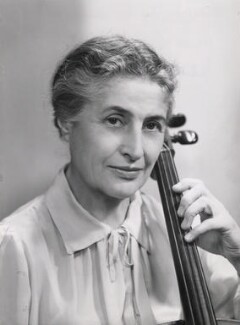Juliette Alvin
Juliette Alvin (1901–1982) was a pioneering figure in the field of music therapy. She is widely recognized for her contributions to the development and establishment of music therapy as a professional discipline.
Early Life and Education[edit | edit source]
Juliette Alvin was born in France in 1901. She showed an early interest in music and pursued her studies at the Paris Conservatoire, where she specialized in the cello. Her passion for music and its therapeutic potential led her to explore the psychological and emotional impacts of music on individuals.
Career[edit | edit source]
Alvin's career began as a professional cellist, performing in various orchestras and chamber music ensembles. However, her interest in the therapeutic aspects of music grew, and she began to focus on how music could be used to aid individuals with various psychological and physical conditions.
Music Therapy Work[edit | edit source]
Juliette Alvin is best known for her pioneering work in music therapy. She founded the British Society for Music Therapy (BSMT) in 1958, which played a crucial role in promoting the field in the United Kingdom. Her work emphasized the importance of using music as a tool for communication, especially for those who had difficulty expressing themselves through traditional means.
Alvin's approach to music therapy was holistic, considering the emotional, psychological, and physical needs of her clients. She worked with a wide range of populations, including children with autism, individuals with mental health issues, and elderly patients with dementia.
Publications[edit | edit source]
Juliette Alvin authored several influential books and articles on music therapy, which have been used as foundational texts in the field. Some of her notable works include:
- Music Therapy for the Autistic Child
- Music Therapy
Legacy[edit | edit source]
Juliette Alvin's contributions to music therapy have had a lasting impact on the field. Her work laid the groundwork for the development of music therapy as a recognized profession, and her methods continue to influence contemporary practice. The British Association for Music Therapy (BAMT), which succeeded the BSMT, continues to honor her legacy by promoting the use of music therapy in various settings.
See Also[edit | edit source]
- Music therapy
- British Society for Music Therapy
- British Association for Music Therapy
- Autism
- Mental health
- Dementia
References[edit | edit source]
External Links[edit | edit source]
Search WikiMD
Ad.Tired of being Overweight? Try W8MD's NYC physician weight loss.
Semaglutide (Ozempic / Wegovy and Tirzepatide (Mounjaro / Zepbound) available. Call 718 946 5500.
Advertise on WikiMD
|
WikiMD's Wellness Encyclopedia |
| Let Food Be Thy Medicine Medicine Thy Food - Hippocrates |
Translate this page: - East Asian
中文,
日本,
한국어,
South Asian
हिन्दी,
தமிழ்,
తెలుగు,
Urdu,
ಕನ್ನಡ,
Southeast Asian
Indonesian,
Vietnamese,
Thai,
မြန်မာဘာသာ,
বাংলা
European
español,
Deutsch,
français,
Greek,
português do Brasil,
polski,
română,
русский,
Nederlands,
norsk,
svenska,
suomi,
Italian
Middle Eastern & African
عربى,
Turkish,
Persian,
Hebrew,
Afrikaans,
isiZulu,
Kiswahili,
Other
Bulgarian,
Hungarian,
Czech,
Swedish,
മലയാളം,
मराठी,
ਪੰਜਾਬੀ,
ગુજરાતી,
Portuguese,
Ukrainian
Medical Disclaimer: WikiMD is not a substitute for professional medical advice. The information on WikiMD is provided as an information resource only, may be incorrect, outdated or misleading, and is not to be used or relied on for any diagnostic or treatment purposes. Please consult your health care provider before making any healthcare decisions or for guidance about a specific medical condition. WikiMD expressly disclaims responsibility, and shall have no liability, for any damages, loss, injury, or liability whatsoever suffered as a result of your reliance on the information contained in this site. By visiting this site you agree to the foregoing terms and conditions, which may from time to time be changed or supplemented by WikiMD. If you do not agree to the foregoing terms and conditions, you should not enter or use this site. See full disclaimer.
Credits:Most images are courtesy of Wikimedia commons, and templates, categories Wikipedia, licensed under CC BY SA or similar.
Contributors: Prab R. Tumpati, MD

